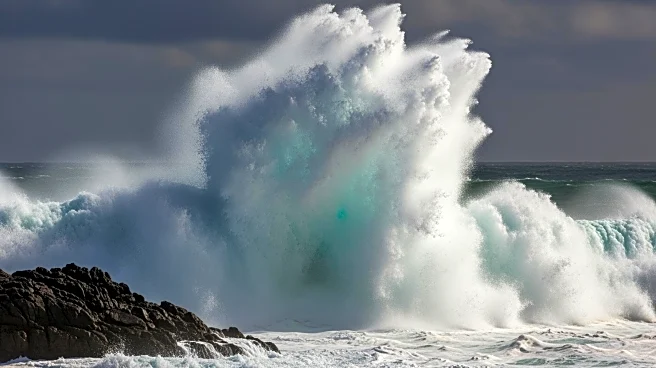What's Happening?
A rogue wave measuring 17.6 meters was recorded off the coast of Vancouver Island, Canada, on November 17, 2020. This wave, documented by a MarineLabs buoy near Ucluelet, has been analyzed by University
of Victoria researchers as the most extreme of its kind relative to the surrounding sea state. Rogue waves are characterized by their sudden appearance and size, often exceeding twice the significant wave height of the surrounding seas. This particular wave was approximately three times the height of the surrounding waves, making it an unprecedented event. The occurrence of such waves is not entirely random, and ongoing research aims to better understand the conditions that lead to their formation.
Why It's Important?
The occurrence of this record-setting rogue wave highlights the increasing unpredictability and potential danger of oceanic conditions. As climate change continues to affect global weather patterns, the frequency and intensity of such extreme oceanic events may rise, posing significant risks to maritime activities, including shipping and offshore operations. Understanding rogue waves is crucial for improving maritime safety and preparing for future oceanic challenges. The data collected from this event will contribute to ongoing research efforts to predict and mitigate the impact of similar occurrences in the future.
What's Next?
Researchers are utilizing a network of coastal buoys to monitor wave behavior around Vancouver Island and beyond, gathering real-time data to identify patterns that precede extreme waves. This research is essential for developing predictive models that could provide early warnings for rogue waves, potentially reducing the risk to ships and coastal infrastructure. As climate change continues to influence oceanic conditions, the need for improved maritime safety measures and climate resilience becomes increasingly urgent.
Beyond the Headlines
The increasing frequency of extreme oceanic events like rogue waves may have broader implications for global shipping routes and coastal development. As the oceans become more energetic, the design and construction of maritime infrastructure may need to adapt to withstand these new challenges. Additionally, the study of rogue waves contributes to a deeper understanding of ocean dynamics, which is essential for addressing the broader impacts of climate change on marine ecosystems.









